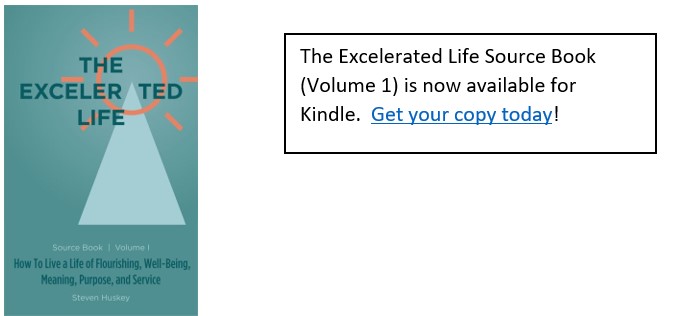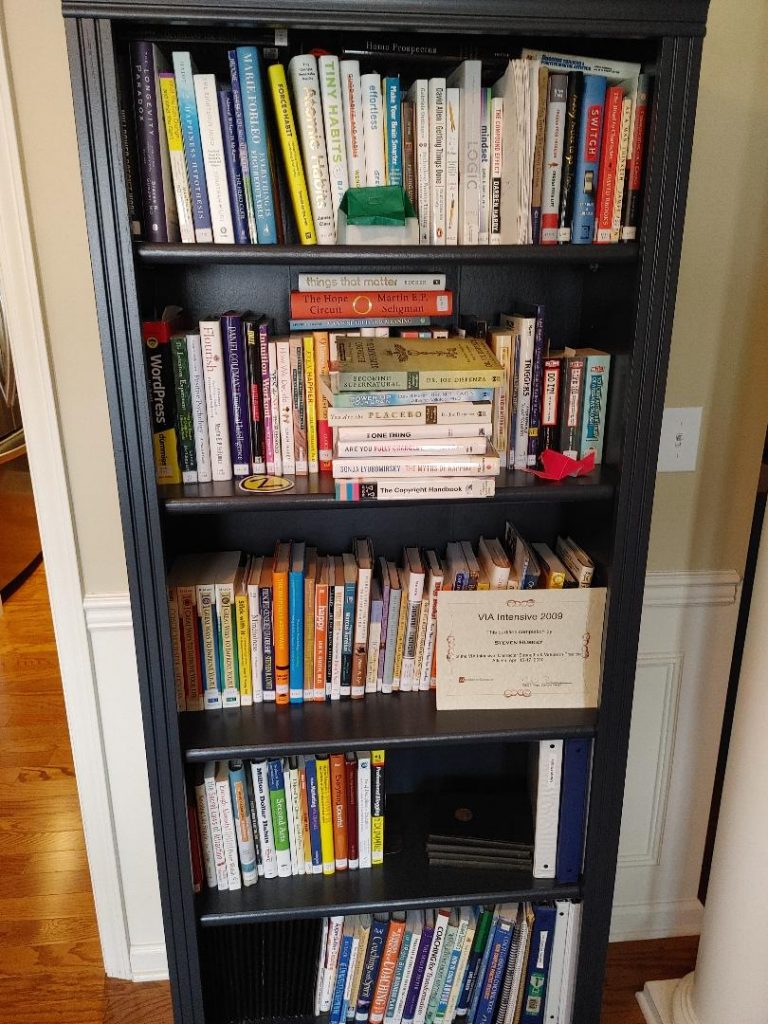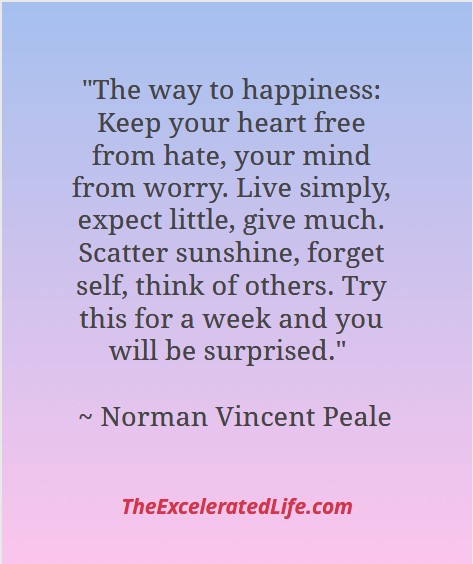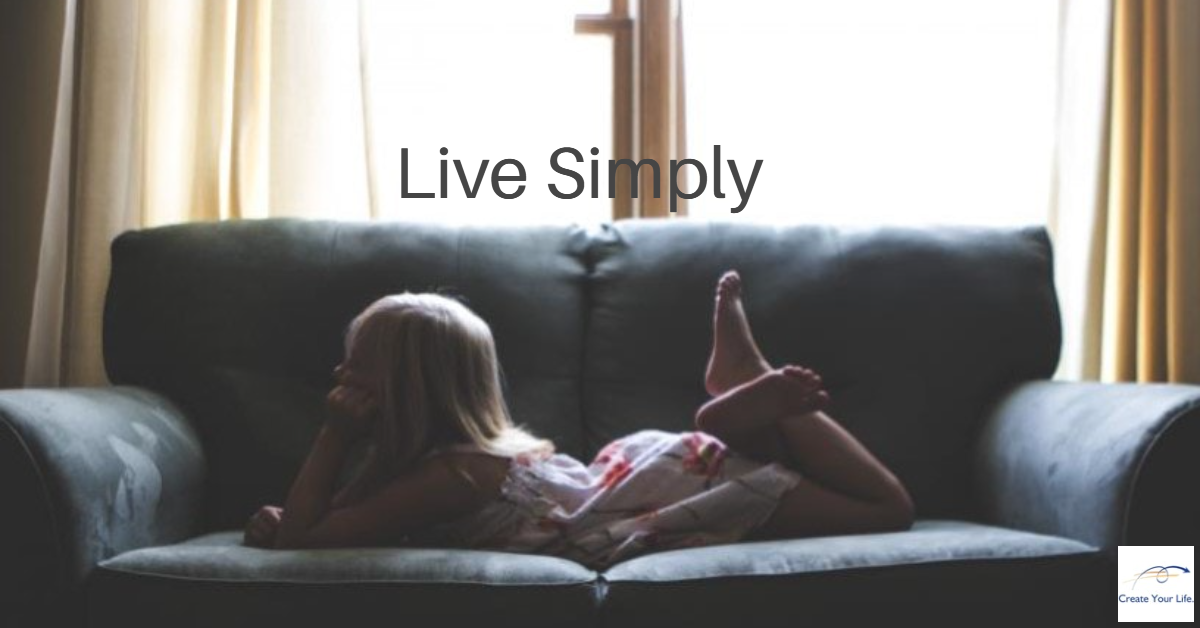If you spend most of your day chasing after external rewards, more things, a bigger “lifestyle”, your life becomes more complicated but not “better”. When you live more simply, you spend less time and money buying things and less time and energy taking care of things you don’t really want or need. You experience a feeling of well-being. And you have more energy, more time, and more money.
Live Simply So . . .
“Live simply so that others may simply live.”
Do you remember that bumper sticker from the 1990s? I once heard a teacher say he really liked that idea. And he also liked his swimming pool warmed to the temperature of 81 degrees. Apparently, it’s a nice sentiment but not that inspiring to actually make us want to do it.
So, here’s another thought. I recently read this in a book by Og Mandino: “I will live today as if it is my last.” [Mandino] Now, I’m not sure you can actually do that. If it really is my last day, and I know it, I’d want my family around to spend my remaining time with them; children, siblings, cousins, nieces, and nephews. But to live as if it is your last day could mean to pay attention, to get the most out of the day, to savor and appreciate each moment, to say a good goodbye.
And that to me is a good reason to live a simple life. Because, as author and blogger John P. Weiss reminds us, “a good death requires a good life”. [Weiss] If you’re spending most of your day chasing after external rewards, more things, a bigger “lifestyle”, your life becomes more complicated but not “better”.

A Good Death Requires a Good Life
“Death is a profound teacher, but no one wants to enroll in the class.” ~ John P. Weiss
For many years, my own life would not have resulted in a good death. I spent my early twenties chasing after cheap thrills, cheap beer, and the next party. Eventually, I settled down, got married, finished school, and started a career. Still, I was so focused on work and on acquiring possessions, that I continued to neglect my health and my family. I had what I thought was a great lifestyle, but still a rather shallow life.
But that strict and persistent teacher, experience, finally got through to me. I became interested in “voluntary simplicity”, a catchword in the 90s. I guess the teacher appeared when the student finally became ready, as is always the case.
Now, money is important, necessary in our modern culture. And the acquisition of certain possessions allows us to have a standard of living beyond the wildest dreams of most people in history. But if we find out too late that making money and acquiring things and taking care of our possessions and trying to keep up appearances with our neighbors doesn’t lead to a life well-lived, well, “a good death requires a good life.”
This is where simplicity comes in. When we simplify our life, stop buying things we don’t need, shed physical, mental, and emotional clutter, then we can focus on the important stuff. [Weiss] Things like relationships, making meaningful contributions, and giving our best in Service to the world.
Why a Simple Life?
“As the world gets faster and faster . . .,” writes Oliver Burkeman in Four Thousand Weeks, “we grow anxious about not keeping up.” And so we move faster, work more, try to get more done. But it becomes a treadmill, going faster and faster and faster! Until, well, you know what happens when a treadmill gets too fast . . .
Some of us may have an idea that living simply means giving up stuff, that it’s a sacrifice rather than an improved way of living. Because we love our possessions. (You should see my bookcase. In fact, here it is . . .)

But living simply isn’t about loss. It may require giving up some things, but only the articles, activities, and, yes, perhaps people that are no longer meaningful or helpful or enjoyable. Instead of focusing on what you’re giving up, look at what you’re gaining: more space, more time, more money, more energy, and more attention to give to those you love. [“What It Means to Live Simply”]
When You Live Simply
These are some of the benefits people have reported once they have made an intentional effort to live simply.
- “Financial sustainability
- Feeling less stressed about money
- Better work–life balance
- More quality time with friends and family
- Increased spirituality
- Environmental sustainability
- Getting a better sense of what really matters
- A greater sense of freedom
- The ability to discover true passions”
[Davis]
When you live more simply, you may experience a feeling of well-being and freedom from owning fewer things. It means you spend less time and money buying things and less time and energy taking care of things you don’t really want or need.
Living simply, you find that you spend less time, energy, and money on nonessentials and you focus more of those resources on the things that are important to you, your essentials. You set limits on technology, removing distractions and gaining time while improving your mental and emotional states. [“What It Means to Live Simply”]
When You Don’t Live Simply
When we take a hard look at our lives, many of us see the results of not living a simple life. Overflowing bookshelves. (Me!) Garages so full we can’t park our cars in them. Endless credit card debt. Drawers and closets overflowing. Clutter on every available surface.
Or how about the wasted time spent on social media nonsense? Cable news hysteria? Binge-watching TV programs we aren’t even all that interested in?
If you sometimes feel like life is more complex than it needs to be, if you feel like society expects you to buy more than is necessary and to own more things than you need, or if you find you are working more than you want, then why not look for ways to live more simply?

How to Begin
How do you begin to live more simply? Your choices range from clearing the clutter off your desk to all-out full-blown minimalism. For most of us, though, somewhere in between those extremes is a good place to start. Here are some ideas, ranging in degree of effort.
Find your “why”. Before you look for how to live more simply, what is your why? You’ll find it easier to decide what you want to give up and pare down when you first decide why you want to simplify. Do you want more time to spend with your family? or to devote to an interest or hobby? Do you want to get out of debt or maybe start saving for an early retirement? Are you too stressed out? What are your reasons, your why? “[W]hen you think it’s too hard to keep going . . . Your whys will help you remember what matters.” [“What It Means to Live Simply”]
Just say “no” a little more frequently. For most of us, when we’re asked to participate in something, we automatically answer “Yes”. We don’t think until later (too late?) how we’ll fit this new opportunity into our schedules (which, remember, are already too full.) A way to address this is to change your default answer to “No”. If that seems too hard, at least let your answer be “I’ll think about it”. Once you do, you may find it is something you really do want to do, in which case you can then decide what to give up for this new activity. More often than not, though, you can go back later with a “No”.
Turn off things. By some estimates, many of us spend more than 2.5 hours per day on social media. Add in other pursuits, such as e-mail and texting, and you see how cutting back on technology can be an improvement. Disconnecting from your technology on a regular basis can free up time and mental energy. In fact, consider Cal Newport’s advice in Digital Minimalism. Instead of taking a break from our phones and other screens, let that be your default. Then you can take breaks from time to time to use your phone or other technological distractions.
Live from a budget. I know, most of us shudder at the idea of keeping track of spending and trying to figure out how much we pay for this and that. But if you’re struggling with debt, or if you want to begin a savings plan or to increase your savings, you need to know where your money is going now and make plans for where you want it to go. Decide what your true needs are, as opposed to merely wants. Then plan your spending accordingly.
Use routines to simplify your life. Having routines for simple daily tasks can save time and effort by eliminating some decisions. It takes less energy than if you have to figure out moment by moment what needs to be done. Some suggestions are to set up morning routines for getting yourself and the kids off to work and school; developing an evening routine for laying out clothes, packing lunches, etc., for the next day; come up with a list of menus you can fix each week to simplify grocery shopping and cooking. What routines could help you simplify your life?
Start Simply
That’s a long list of things to do so let’s simplify how to start. If you are really feeling the urge to simplify, start with your “why”. This can point you in the direction you can take to get started. Or if you need some ideas to spark your own creativity, scroll through the Excelerated Simplicity™ archives at TheExceleratedLife.com.
Once you know what you want to do, don’t wait! Do something, take some small step right away. Otherwise, it’s easy to put it off indefinitely till it passes out of your mind and off your radar.
If you are feeling overwhelmed, with too many demands on your time, money, energy, and internal resources, why not begin to simplify? Remember, living simply isn’t only about giving up stuff; it’s also about gaining more – more time, more money, more energy, more peace of mind. If that appeals to you, do something to begin to simplify your life today. That is embracing your Excelerated Life™!
How could simplifying your lifestyle improve your life?
What is one small step you could begin today?
Share your ideas by leaving a post below.
Excelerated Simplicity™ — freeing yourself from unnecessary complexity — is one step in creating your Excelerated Life™, a life of flourishing and well-being, and a life of meaning, purpose, and service.
Read more about the Excelerated Life™.
Resources:
Burkeman, Oliver. Four Thousand Weeks: Time Management For Mortals. New York: Farrar, Straus and Giroux, 2021.
Davis, Ph.D., Tchiki. “How to Live Simply.” Psychology Today. Sussex Publishers, LLC, June 20, 2022. Web. January 21, 2023.
https://www.psychologytoday.com/us/blog/click-here-for-happiness/202206/how-to-live-simply
Mandino, Og. The Greatest Secret in the World. New York: Bantam Books, 1978.
Newport, Cal. Digital Minimalism: Choosing A Focused Life In A Noisy World. New York: Portfolio/Penguin, 2019.
Weiss, John P. “Why a Good Death Requires a Good Life.” becominingminimalist. becomingminimalist, January 19, 2023. Web. January 21, 2023
https://www.becomingminimalist.com/a-good-life/
“What It Means to Live Simply — And Tips to Start.” PsychCentral. Healthline Media, reviewed December 16, 2017. Web. January 21, 2023.
https://psychcentral.com/blog/what-it-means-to-live-simply-and-tips-to-start#1


